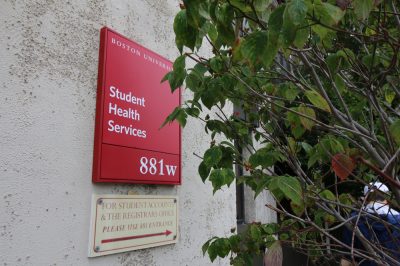Boston University Student Health Services launched TRANScendence, a new support program aiming to support LGBTQIA+ students on campus and has been hosting weekly meetings since Oct. 18.

BU Behavioral Medicine Director Kara Cattani described the program in an email as “a safe space for exploring topics that may create distress such as body image, relationships, or identity and a place to find support and identify ways to cope with distress and become more empowered.”
Students can attend the TRANScendence meetings to discuss matters of body image, relationships, identity or sexuality, according to the SHS website.
“Historically, traditional LGBTQ spaces have not been as welcoming to trans and gender diverse folks and their needs were not prioritized,” Student Health Services Groups Coordinator Dr. Ilana Licht wrote in an email. “As a result, the TRANScendence group aims to provide a supportive space for these folks.”
Ninety four percent of BU’s peer institutions had paid staff dedicated explicitly to LGBTQIA+ student support, but BU was one of four institutions that did not, according to a 126-page report that outlines the results of a comprehensive climate survey on the queer BU experience published by LGBTQIA+ Task Force on Nov. 7, 2022.
Student Health Services created TRANScendence after the LGBTQIA+ task force requested it in its report.
“Our research reveals that while BU has made strides toward implementing inclusive practices, much more can and should be done to support LGBTQIA+ students,” according to the executive summary.
The final report made 16 recommendations to help the LGBTQIA+ student experience at BU become more equitable and inclusive. The establishment of a professionally staffed LGBTQIA+ Student Resource Center was at the top of the list.
Cattani outlined recent efforts to address the LGBTQIA+ Task Force’s broader concerns.
“We have worked to follow through with their ideas which we see as important steps towards offering inclusive and compassionate care,” Cattani wrote in an email. “This past year, Student Health Services has expanded the number of medical staff who provide trans and non-binary students supportive general primary care and specialized gender-affirming treatment.”
Cattani wrote that all medical and mental health providers attended a training in the spring on best practices in gender affirming health care, and that this Fall, mental health clinicians received training to write letters advocating for patients.
Yash Patel, a junior in the College of Arts and Sciences, head of the IMPACT committee, and member of the LGBTQIA+ Task Force, said BU must continue to support LGBTQIA+ students.
“While the creation of the center is a historic win, it’s crucial to recognize that there still must be continuous, concerted effort to improve BU’s culture and climate for the LGBTQ students,” Patel said. “We strongly caution against complacency.”
Kali Prada, a sophomore in the College of General Studies, has been attending meetings since TRANScendence began.
“It’s a very safe space where you feel comfortable around a small, tight-knit community, and it’s very helpful for those that lack that community,” Prada said. “It’s a step in the right direction. We should be striving for equality throughout BU.”
Basil Mitchell, a junior in the College of Communications, said she worries that students may not be aware of the group and believes the program is beneficial.
“There previously haven’t been many resources for queer students, but I think a resource center is perfect,” Mitchell said. “I hope students use that, I just think they should advertise more to students, because I didn’t know about it.”
Sidney Kaplan Stellino, a sophomore in the College of Arts and Sciences, also said there should be more advertisements so students can be informed about the program’s significance.
“I haven’t seen much about the program except for when I was at the behavioral center, and it was playing on a screen for two seconds before it changed to an ad,” Stellino said. “I still don’t really understand how to join it or attend at all.”
Licht said community is important when it comes to supporting queer students on campus.
“Having connection with people who are experiencing something similar can be powerful in navigating those experiences,” she wrote.












































































































